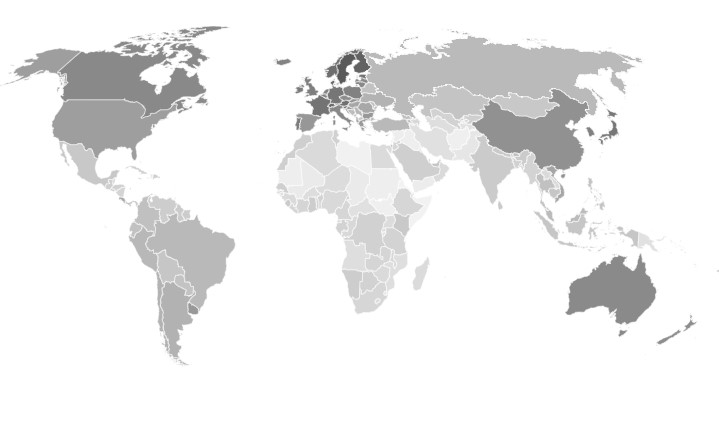China surpasses the USA, Scandinavia continues to lead the Global Sustainable Competitiveness Index
SEOUL, KOREA and ZURICH, SWITZERLAND / ACCESSWIRE / December 20, 2024 / First published in 2012, the Global Sustainable Competitiveness Index (GSCI) measures country-level ESG performance based on 216 quantitative indicators. The GSCI serves as inclusive alternative to the GDP, to assess country-specific and issue-specific risks for operators and investors, and to verify progress for government agencies. The GSCI is officially used by five national governments to benchmark their progress on the path to sustainable competitive development.
GSCI 2024 key observations:
Scandinavia keeps dominating the Sustainable Competitiveness Index, Sweden tops
Asia is leading the Intellectual Capital Index, North-Western Europe the Social Capital Index
China (ranked 28) overtakes the US (35)Japan is ranked 12, Germany 15, the UK 16, France 18
Significant untapped potential for win-win solutions: the highest score achieved is 61 (Sweden), while the global average is 43.4 out of a possible 100Conventional sovereign bond ratings fail to fully recognise & integrate risks and opportunities
Sustainable Competitiveness
Sustainable competitiveness is the ability to generate and sustain inclusive wealth without diminishing the future capability of sustaining or increasing current wealth levels.
The Global Sustainable Competitiveness Index (GSCI) measures sustainable competitiveness based on 216 quantitative indicators derived from international organisations (World Bank, IMF, various UN Agencies). The indicators are grouped into six foundations of competitiveness of a nation-economy:
Natural Capital Index The given natural environment
Resource Efficiency Index Resource usage per capita and per economic output
Social Capital Index: Social cohesion, health, freedom, security, equality
Intellectual Capital & Innovation Index:Education and innovation indicators
Economic Sustainability: Sustainable economic development, business and economic frameworks & performance
Governance Performance Index:Infrastructure, resource allocation, corruption, and fiscal considerations
All indicators are evaluated as-is, and analysed against correlation and trends using sophisticated deep-learning AI tools. The outcome is a comprehensive view of strengths and weaknesses, as well as an indication of the direction and future potential for each country.
Key insights from the Global Sustainable Competitiveness Index 2024:
Scandinavia continues to make its mark on the Sustainable Competitiveness Index: of the top 5 spots, 4 are Scandinavian. Sweden keeps topping the Index, followed by Finland and Denmark;
Northern European countries dominate the top 20 rankings: only two countries in the Top 20 are not European: Japan on 10, and South on 16;
Asian nations (South Korea, Japan, Singapore, and China) lead the Intellectual Capital Index - the basis of innovation.
The Social Capital Index ranking is headed by Northern European (Scandinavian) countries, the result of economic growth combined with a commonly accepted social consensus
China is ranked 28, excelling in Intellectual Capital but lags in Natural Capital and Resource Efficiency, albeit with encouraging signs of efficiency improvements;
The US is ranked 35, performing comparatively poor in resource efficiency and social capital, reflecting a decline that could potentially undermine the global status of the US in the future;
Germany ranks 9, France 8, and the UK 14 while of the emerging economies Brazil ranks 52, India 90, and Nigeria - Africa's most populous nation - 145;
Some of the least developed nations have a considerable higher GSCI ranking than their GDP would suggest (e.g. Vietnam, Colombia, Peru, Nepal, Bhutan, Bolivia, …);
Countries savaged by violent conflicts (Sudan, Yemen, Eritrea, Libya, Somalia, Afghanistan) are at the bottom of the GSCI;
The global gap to a perfect sustainable competitive World is 56.1. We are far from an inclusive and circular society that lives in equilibrium with the natural environment;
Tribalism, distracting cultural wars, struggles for perceived personal power, and armed conflict are complicating (if not preventing) the implementation of simple, efficient, profitable and readily available solution;
There is immense untapped potential. Policies geared to maximise efficiency improvements could lead to significant positive developments throughout all dimensions
Read more here, or download the Global Sustainable Competitiveness Report 2024

The Global Sustainable Competitiveness World Map 2024
View additional multimedia and more ESG storytelling from SolAbility on 3blmedia.com.
Contact Info:
Spokesperson: SolAbility
Website: https://www.3blmedia.com/profiles/solability
Email: info@3blmedia.com
SOURCE: SolAbility
View the original press release on accesswire.com
